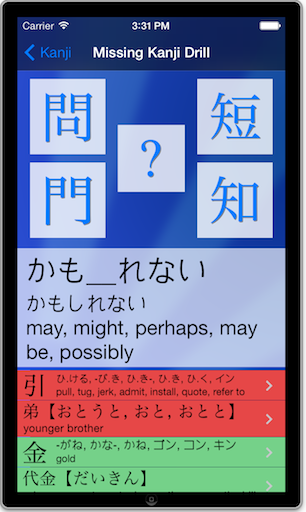KanjiBox 1.5 is currently going through beta-testing and, while I wait for feedbacks and bug reports (fingers crossed for a public release by mid-november), I thought I’d mention something funny I noticed about KanjiBox App Store reviews (but that probably applies equally well to most other app reviews out there). Absolutely nothing of substance regarding KB dev or upcoming features in the present post (that stuff is coming in another post, when release is impending).
In theory, app store reviews are a great way to promote your app through word of mouth and for users to avoid paying for sleek-looking crappy apps. Human nature being what it is, things rarely work out like that. Leaving review is not only optional, but even slightly difficult for most casual users. People with specific grievances are much more likely to make the extra effort to gripe on the review page than regular happy users.
This would not be such a problem, if all users were equally thoughtful rational people who read the doc before complaining about missing features (that are in fact there) or random lack of compatibility (despite warnings in big bold letters)… I have in the past downloaded perfectly fine apps, with horrendous rating average which, upon closer inspection, were due to a handful ultra-negative reviews bemoaning the lack of feature X or Y (when usually feature X or Y would be either useless or already implemented).
But back to KanjiBox. Over time, I have noticed something interesting about negative/mediocre reviews… Every single one of them can be put in one of three categories: regular, kindergarten blackmailer and… French!
Let me explain…
Regular negative reviews are by far the rarest: some users may have legitimate reasons to dislike the app, whether it be some unique configuration issue leading to crashes or they feel that the app does not fulfill their expectations… I might not agree with their stand (and obviously, I strive to fix every single bug that’s ever reported to me… although it helps a great deal if they are reported through proper support email rather than anonymous one-way reviews), but at least, these (rare) reviews make sense.
The vast majority of negative reviews, however, fall into a category that I have come to nickname “kindergarten blackmail”. They are people who really, really want a feature implemented into KanjiBox, but do not think it worth contacting me directly to put in a humble feature request. Instead, they leave reviews along the line of “This is a great app, but it doesn’t have feature X, so I can’t possibly give it more than 2 stars” or “I will give it 5 stars instead of 3 if you add feature Y” (not kidding: I literally have had such reviews).
First off, it beats me how these people could think that dickish trade offers will really sway me into dropping the entire development roadmap and get to work on their pet feature, all in some hope of getting into their good graces: seriously, if you are gonna try to put the heat on somebody, make sure your leverage is more than a couple rating stars in an online app repository. But the worst part is that, in every single case, that feature X or Y is either 1) already implemented (and clearly described in the Help section they never bothered to read) 2) completely out of the scope of the application (“why can’t it tell me my name in Japanese?!?”) or 3) thoroughly useless to most other users (“make it compatible with my Newton PDA”)…
I carefully address every single feature request sent to me by mail: many have made it into updates, some are in the To Do list, a few others I have taken the time to justify why they were not practical, desirable or do-able. Needless to say: passive-aggressive demands slipped into negative reviews are blatantly ignored (good thing none of them are relevant in the first place).
The third significant category of reviewers, I kid you not: the French.
At first, I thought I was just over-analysing mere coincidences. But after over a hundred reviews in both online and iPhone versions: there is a very significant pattern of rating for French commenters1. In a nutshell, reviews go something along the line of: “OMG, this is the best thing since warm bread and sliced water! I want to have its kids! It does everything I’ve ever dreamt of and more. [...] 4/5 stars”. Seriously, what’s up with the never-give-top-rating-despite-ostensibly-loving-it thing? Just keeping some margin in case something even better comes along? don’t want to appear uncool for unabashedly supporting a piece of software without some restraint? only perfection deserves 5/5 and perfection’s not human?
Beside showing how pointless the whole rating system is (everybody has a different scale and radically different interpretations of what 1 or 5 stars mean), this immutable pattern of French rating has amused me to no end. I swear I can practically see Jean-Paul Belmondo finishing his review, dragging on a Gitane, mumbling “bof” and casually giving it a 4/5 out of existential boredom.
Anyway, all very superficial stuff: although reading positive reviews is always heart-warming, I honestly believe that KanjiBox is one of the best app out there, particularly in its price range… Most importantly, I develop it because I like it, not out of some hope of becoming some hypothetical overnight App Store sensation (apps like iFart obviously stand much better chance at that). Reading inane negative reviews by morons who obviously shouldn’t be allowed near a piece of electronic, while cringe-inducing, is unlikely to make me change my mind about the whole thing.
- In fact, it is pretty much what my job is about (my real job, the one I do during the day when I am not wasting hours coding pointless iPhone apps or reading online reviews): detecting patterns and analysing their significance. [↩]

